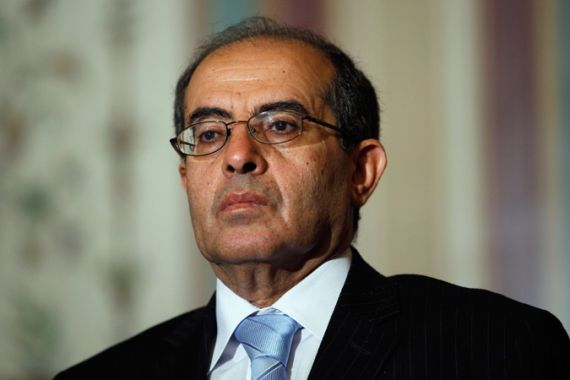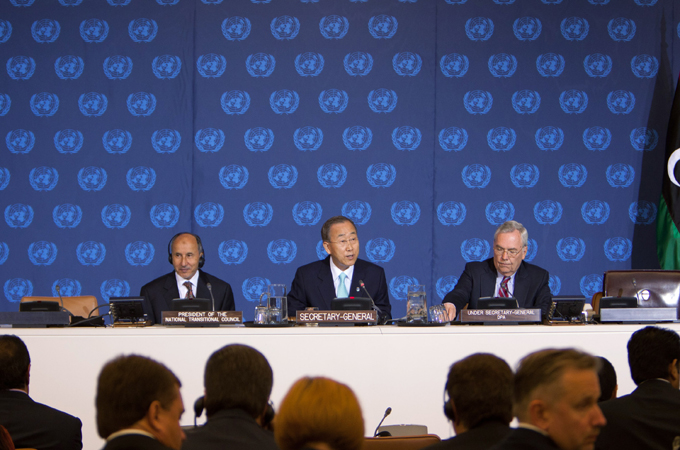Has the AU done too little, too late?
After months of deliberation, the African Union has recognised Libya’s new leadership – but many question its motives.

 |
| The UN Security Council maintains friendly relations with Libya’s National Transitional Council [GALLO/GETTY] |
In a year when the world’s attention to global affairs has significantly focused on the African continent – from the Ivorian crisis, to the Arab Spring and the Horn of Africa’s drought – the African Union has played a less than dismal role.
In principle, the AU has a responsibility to protect, as Article 4(h) of the AU Constitutive act entrusts the organisation with a duty of care on humanitarian grounds, but in reality the AU has failed to act. After months of dithering, the AU officially recognised Libya’s National Transitional Council (NTC) in New York at an AU peace and security meeting held alongside the UN General Assembly gathering.
It would have been a little more than embarrassing for the AU to insist on non-recognition, while Mahmoud Jibril addressed the UN as Libya’s de facto leader.
Though it’s unclear to what extent international pressure forced the AU’s hand, it’s possible this was a strategic attempt to return to the global community. At an assembly where African states are asking for two permanent seats in the Security Council – South Africa, Nigeria and Gabon are non-permanent members – the AU has finally realised it has to play ball, otherwise African requests for membership would be ignored.
It would also seem hypocritical for the AU to stubbornly cling to non-recognition, while the Security Council, representing its permanent and non-permanent members, maintains a friendly policy towards the NTC.
Other than international concerns, the AU had already begun to warm towards the NTC on its own accord. Headed by President Jacob Zuma of South Africa, the AU High Level Ad-Hoc Committee on Libya met in Pretoria on September 14 and called for the establishment of a broadly representative administration as the main condition for recognition.
Previously assured that Libya and the NTC’s “strategic commitment to the African continent” remained a priority; the AU delegation considered the possibility of the NTC taking up Libya’s seat in the AU Peace and Security Council (AU PSC), “based on the exceptional circumstances in and the uniqueness of the situation of Libya”. This was a crucial, but belated step towards acknowledgment, and it will be interesting to see how the new Libya gets along with Zimbabwe and Equatorial Guinea – as both are Gaddafi-friendly members of the AU PSC.
Given the splits between pro-NTC states such as Egypt, Nigeria and Tunisia and the undecided South Africa – which has implicitly aligned itself with influential Gaddafi sympathisers; Zimbabwe, Algeria and Angola – it is likely the AU will struggle to maintain a unified and positive position on Libya.
Different strategies, same aim
 |
| Algeria’s president said he would not allow Gaddafi to hide in his country [GALLO/GETTY] |
The news of Muammar Gaddafi’s family crossing into Algeria and the expulsion of the Libyan ambassador to Zimbabwe was an expected twist in events. It’s expected, because it’s natural that the colonel’s political allies would protect his family in Algiers and protest the hoisting of the new Libyan flag in Harare.
It’s also unsurprising that Prime Minister Carlos Gomes Jnr of Guinea-Bissau, an old friend of Gaddafi, would offer to “welcome him with open arms”. Sharing an anti-imperialist, iron-fisted ruler-for-life ideology, these acts also reflect the feelings of the majority of leaders in Africa who have expressed reservation towards the Libyan government in waiting.
Of fifty-five African countries, twenty states have recognised the NTC. In a surprise move, Nigeria acknowledged the rebels, days before the African Union was due to meet in Addis Ababa over Libya in August.
There are several reasons for this, including wanting to appear on the right side of democracy, secure West African relations with Libya’s new leaders, and to appear progressive in front of the international community – not least because the throne left by Gaddafi is open for the taking.
While President Goodluck Jonathan may not have pockets as deep as Gaddafi, nor the intent to extend his influence through money, Nigeria is aware of the new possibilities to assert its status as a regional superpower in a post-Gaddafi Africa.
Though Nigeria may have fallen in line with influential Arab states in Africa; Abdelaziz Bouteflika of Algeria, has carved a different path.
Nervous about the potential impact if Libya were to split into sparring tribes, Bouteflika, like the AU, demanded that a tribally representative transitional government be formed as a key condition for Algeria to recognise the NTC.
Although Algeria took in Gaddafi’s family, Bouteflika was quick to promise there was no room at the inn for the Brother Leader, saying, “never did we consider the idea that one day Mr Gaddafi could come knocking at our door”.
Realising there is a new political reality in a post-Ben Ali, post-Gaddafi, post-Mubarak Maghreb, Bouteflika has maintained cordial relations with the NTC – and the AU’s change of heart on Libya may now push Algeria into welcoming the new neighbouring government.
This may be a good move, but it means external pressure on the NTC to form an inclusive and stable transitional regime is significantly reduced, especially now that the rebels have indefinitely suspended all plans to form an administration.
Shifting sands
With Gaddafi gone, Algeria will have the chance to flex its muscle, particularly in the Sahel and Maghreb regions where it has historically wielded a lot of power. Like Jonathan, Bouteflika’s plans are not to create a Gaddafi-esque United States of Africa – positioning himself as King of Kings instead of Libya’s former leader, but he is likely to take advantage of his good standing with the AU and try to gain more support for Algeria’s foreign policy.
For example, a stronger AU backing in Algeria’s role in Western Sahara’s war against Morocco’s military occupation, or, acting in self-interest, a more dominant position on the continent, may be of use to Algeria in gaining support in the regional war against al-Qaeda in the Maghreb (AQIM). This was the aim of the Sahel region anti-terrorism conference convened in Algiers earlier this month.
As Algeria has considerably less influence with the Arab League, it would not be surprising to see Bouteflika jostling for Gaddafi’s crown, along with the new Libyan regime – which stands to inherit a sea of profitable and bankrupt investments across the continent.
As for the AU, the Libyan revolution has shown that there is a deep crisis in its crisis management.
Initially, the AU refused to recognise the NTC because it was an unelected government, but when an unelected megalomanic launched an attack, killing thousands of his own people; the AU buried its head deep in the Sahara’s sands unwilling to chastise Gaddafi.
Although the absence of Gaddafi’s political and financial contribution to African politics will be keenly felt, the AU sends a message to the world that the ethic of responsibility to protect is interpreted as protecting one’s own.
The oft-repeated slogan “African solutions to African problems”, increasingly sounds more like feel-good, empty rhetoric than concrete philosophy and strategy. For months, the AU hawked around its roadmap to peace for Libya, despite the fact that, from the outset, the NTC and the heckling protesters of Benghazi had expressly rejected the plan.
Up until early September, Zuma appeared confident of the AU’s mediation efforts, claiming had the AU peace plan been followed there would have been far fewer Libyan casualties. However, by recognising the rebels, the AU has now inadvertently conceded the failure of its proposed strategy.
Whichever course Libya’s future relationship with the AU takes, it’s clear that the organisation’s limited resources and questionable political allegiances will hang over it like a rain cloud. If the AU, in all its anti-imperialist glory, failed to balance its principles of African humanity, sovereignty and responsibility to protect in the Libyan question or to raise funds for the Horn’s famine, future crises requiring international intervention will be dealt with in the same way – with the AU hovering in the shadows enacting its do-little policy, while others act – rightly or wrongly.
Tendai Marima is a Zimbabwean blogger and doctoral student at Goldsmiths, University fo London whose research interests include African literature and global feminist theory.
Follow her on Twitter @konwomyn
The views expressed in this article are the author’s own and do not necessarily reflect Al Jazeera’s editorial policy.
